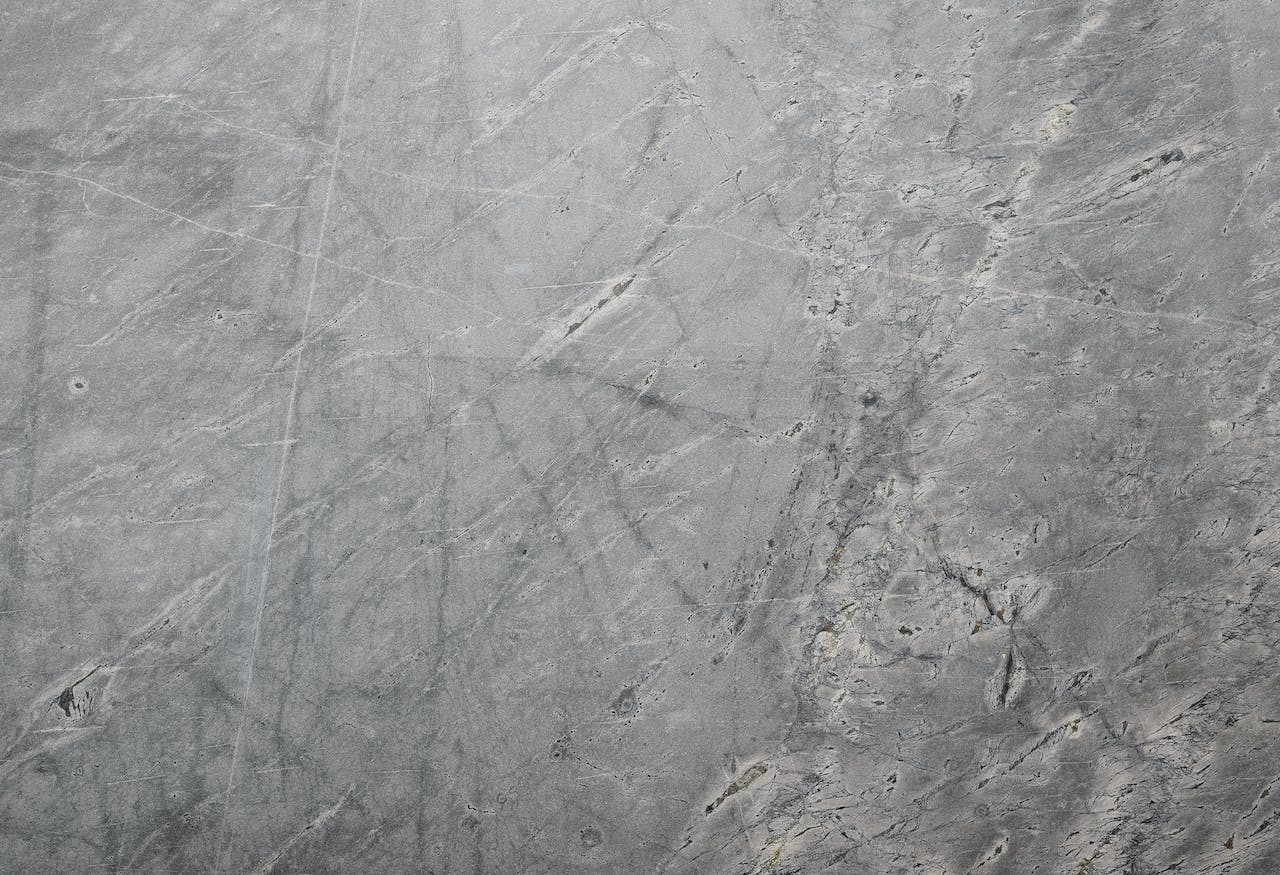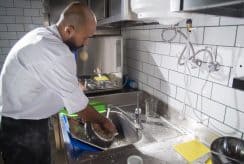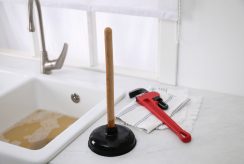There are several misconceptions about epoxy floors. These misconceptions can cause confusion for those considering the benefits of having a high-quality floor coating.
Epoxy can protect concrete from chemical stains, abrasions and other issues that can damage the surface. Unlike paint, it offers a durable resin coating that is anti-slip and leaves an attractive, shiny finish.
1. It’s Not Safe
Epoxy flooring has a bad reputation for being dangerous. This is because people are unaware of the fact that it’s a safe flooring solution when installed properly by professionals. It is not the same as other flooring options such as tile, carpet or wood floors, which require a number of tools and equipment to install.
Unlike these other flooring options, epoxy requires only a few simple tools to roll it out and cure. This reduces the need for harmful machinery and the amount of chemicals required for installation. In addition, the materials used in epoxy are much less toxic than those found in other flooring options.
Epoxy is also very safe to work on once it’s fully cured. It’s resistant to dents and stains and can withstand the weight of heavy cars, trucks, and machinery. Additionally, epoxy is waterproof and does not absorb water, which makes it a great surface for garages to park vehicles on for extended periods of time. This will prevent rust and corrosion, which is typically caused by the constant exposure to salt and other corrosive materials.
2. It’s Not Durable
One of the common misconceptions about epoxy flooring is that it’s not durable. In reality, epoxy floors can withstand heavy foot traffic and impact damage while remaining scratch and chip resistant. This makes them an excellent choice for commercial and industrial facilities.
Additionally, the surface of epoxy floors is non-porous, making it a great solution for areas that need to be kept clean and dry. This prevents moisture and bacteria from penetrating the concrete floor and potentially causing health issues or structural problems.
Epoxy flooring also provides a protective layer over the concrete. This means that it’s not only tough but also resistant to chemicals, abrasions, and stains. This can make it an ideal option for kitchens, bathrooms, and other high-traffic areas.
When properly installed by a professional, epoxy floors can last for years. However, they require regular cleaning and maintenance to keep them looking their best. This includes sweeping, mopping, and using a floor cleaner that’s safe for epoxy. By following these tips, you can help ensure that your epoxy floor will last for as long as possible.
3. It’s Not Versatile
Epoxy floor coatings are highly customizable and can be mixed with a variety of materials to create a design that meets any aesthetic. Whether you want to make a statement with a bright metallic sheen or something more natural, epoxy can give you the color and texture you need to turn any room into a work of art.
Epoxi is very easy to work with, but it can be very easy to mess up if you’re not careful. It’s important to follow the directions provided by your epoxy manufacturer, and always use a professional for application. If you do something wrong, like accidentally add water to the mix or fail to properly prep your floor, it could ruin your entire installation and cause costly mistakes.
It’s also important to be aware that epoxy can yellow and become chalky with excessive exposure to direct sunlight. However, this problem can be avoided with proper maintenance and the use of an epoxy that includes UV protection. Considering how versatile and cost-effective epoxy is, it’s an excellent choice for many homes and businesses.

4. It’s Not Affordable
Epoxy floors are a great option for many different applications. They are attractive, hygienic, and easy to maintain. They are also highly durable and cost-effective compared to other flooring options. This is why it’s a shame that so many people avoid epoxy floors because they think they are too expensive.
This myth is due to a few things. First, epoxy coating is actually quite affordable when it’s installed properly by a professional. Second, a lot of DIY epoxy coating kits that are sold at home improvement stores actually end up being cheaper than professional-grade 100% solids epoxy products. This is because professional epoxy requires the right proportions of resin and hardener, which is only possible with a high-quality product.
Finally, this myth is also due to the fact that a lot of people confuse epoxy with paint. While it may look similar at a glance, epoxy is a protective flooring solution and not just another type of paint. It’s a tough surface that is designed to protect your floors from damage caused by hot tires, chemicals, excessive heat, and standing water. Explore the cost-effective options for epoxy flooring installation outlined on www.ascentepoxybroward.com and discover how affordable and durable this flooring solution can be with the expertise of seasoned professionals.
5. It’s Not Easy to Install
While it may seem easy to pour on a few coats of epoxy, you cannot get the best results with DIY applications. This is because you need to prepare the concrete floor correctly before you can apply the epoxy coating. You will also need to have the right mixture of resin and hardener to ensure a successful application.
Professionals who specialize in epoxy flooring have extensive training and years of experience. They know the techniques required to create a beautiful, high-quality floor that lasts for many years.
Epoxy can withstand harsh chemicals and other substances, including oils, gasoline, and brake fluids. It is also a fire-retardant material.
However, if you allow these chemicals to spill on your epoxy floors, they can discolor the surface. This is because carbon monoxide and other gases can react with the resin to make it yellow or change color. This is why it’s important to have a professional epoxy floor installer do your work. These professionals will use a shot blaster to remove the top layer of concrete before applying the epoxy coating. They will then mix the resin and hardener correctly to avoid these reactions.
6. It’s Not Non-Slip
Epoxy does not provide slip resistance on its own. However, it is often combined with raised bumps for anti-slip benefits. These features are perfect for industrial floors that must prevent employees from slipping and falling. The bumps can also be used to contain spills or other liquids that could otherwise make the floor slippery and unsafe.
Like any surface, epoxy floors can become slippery when wet. Professional installers are able to reduce this risk by including a slip-resistant aggregate in the final coat of the epoxy floor. This roughness adds traction and makes the floor safe to walk on even when it’s wet.
If the floor has oil, grease, wax, paint, or other chemicals on and IN the concrete slab before an epoxy floor is installed, it will not bond correctly to the substrate. Moisture migrating through the slab (moisture vapor transmission) is another guarantee that an epoxy floor will fail.
As you can see, the truth about epoxy flooring is much more complex than what many people think. That’s why it’s so important to trust a professional flooring company. These experts have years of experience and training that help them do their jobs flawlessly.
7. It’s Not Easy to Clean
Epoxy is extremely durable, but it can scratch if it’s not cleaned properly. A soft-bristle broom or leaf blower can help remove loose dirt, dust, and debris from the floor prior to mopping. After sweeping, a clean mop and clear ammonia solution can be used to sanitize the surface. Cleaners with citrus or acidic solutions should be avoided, as they can dull the epoxy’s shiny surface.
It’s also important to note that epoxy can be damaged if the concrete substrate is not prepared correctly. This is similar to putting a beautiful roof on a house with a faulty foundation—the result will be catastrophic.
A professional epoxy flooring contractor has the tools and years of training to prepare a concrete surface for an epoxy coat. Attempting to do it yourself will not only result in a sub-par finish, but may cause the epoxy to bubble and peel. This can lead to a large repair bill and costly floor replacement costs. This is one of the main reasons why hiring a professional is always the best option.
8. It’s Not Easy to Maintain
This myth is due to a lack of knowledge about epoxy flooring and how it can be used. While epoxy is a versatile and durable solution, it is not the perfect floor for every application. By separating fact from fiction, people can make informed decisions about their flooring needs. This helps ensure successful floors that are long-lasting, safe, and visually appealing.
One of the main reasons why many epoxy floor coatings fail is because they are not installed on a correctly prepared concrete substrate. Incorrect surface preparation results in an epoxy bond that is weak and breaks down quickly. This is similar to building a house on a faulty foundation. It doesn’t matter if you put high-end cabinets, really nice millwork and doors on it, or the best windows available – a house built on a bad foundation will always fail.
It is important to note that a professional flooring contractor has years of experience and training when it comes to installing epoxy floors. These experts can properly prepare a concrete slab, ensuring an epoxy bond that is strong and long-lasting. Proper surface prep can also reduce the need for frequent re-coatings.





